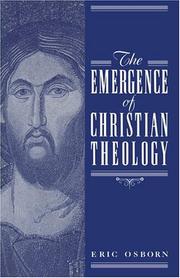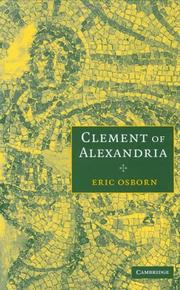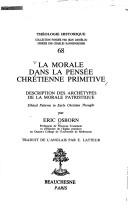| Listing 1 - 7 of 7 |
Sort by
|

ISBN: 052143078X 0521022320 0511598025 9780521430784 9780511598029 9780521022323 Year: 1993 Publisher: Cambridge Cambridge University press
Abstract | Keywords | Export | Availability | Bookmark
 Loading...
Loading...Choose an application
- Reference Manager
- EndNote
- RefWorks (Direct export to RefWorks)
There are special times of movement in the history of ideas, and one such time - as the author of this study shows - was the second half of the second century, when Christian thought showed fresh vigour. By concentrating on five seminal Christian thinkers of the second century (Justin, Athenegoras, Irenaeus, Clement of Alexandria, and Tertullian), Eric Osborn illustrates how it was that Christianity made monotheism axiomatic to its central doctrinal claims while adapting, too, to the peculiar circumstances in which it developed. The stimulus for new thought came from the objections of the state, philosophers, Jews, Gnostics, and Marcion, who in different ways denied the Christian claim to faith in one God. In response, Christian thinkers argued for one God who was the first principle of being, goodness, and truth. In its presentation of the lively beginning which brought Christianity and classical thought together, this book casts light on the growth of the European intellectual tradition.
Church fathers --- Fathers of the church --- Kerkvaders --- Patristic philosophy --- Patristics --- Patristiek --- Patristique --- Patrologie --- Patrology --- Philosophy [Patristic ] --- Pères de l'Eglise --- Philosophical theology --- Theology, Doctrinal --- Théologie philosophique --- Théologie dogmatique --- History --- Histoire --- Bible --- Philosophy --- Philosophie --- -Histoire --- 230.2 "00/03" --- -Theology, Doctrinal --- -Christian doctrines --- Christianity --- Doctrinal theology --- Doctrines, Christian --- Dogmatic theology --- Fundamental theology --- Systematic theology --- Theology, Dogmatic --- Theology, Systematic --- Theology --- Theology, Philosophical --- Philosophy and religion --- Philosophy, Patristic --- Christians --- Theologische scholen--(verder in te delen zoals 28)--?"00/03" --- -Doctrines --- -Theologische scholen--(verder in te delen zoals 28)--?"00/03" --- -230.2 "00/03" --- 230.2 "00/03" Theologische scholen--(verder in te delen zoals 28)--?"00/03" --- -Church fathers --- Christian doctrines --- Pères de l'Eglise --- Théologie philosophique --- Théologie dogmatique --- History. --- Biblia --- Theology [Doctrinal ] --- Primitive and early church, ca. 30-600 A.D. --- Arts and Humanities --- Religion --- Theology, Doctrinal - History - Early church, ca. 30-600 --- Fathers of the church.
Book
Year: 1976 Publisher: Cambridge-London-New York Cambridge University Press
Abstract | Keywords | Export | Availability | Bookmark
 Loading...
Loading...Choose an application
- Reference Manager
- EndNote
- RefWorks (Direct export to RefWorks)

ISBN: 0521837537 9780521837538 9780511734922 9780521090810 0521090814 0511734921 Year: 2005 Publisher: Cambridge Cambridge University Press
Abstract | Keywords | Export | Availability | Bookmark
 Loading...
Loading...Choose an application
- Reference Manager
- EndNote
- RefWorks (Direct export to RefWorks)
Clement of Alexandria (150-215) lived and taught in the most lively intellectual centre of his day. This book offers a comprehensive account of how he joined the ideas of the New Testament to those of Plato and other classical thinkers. Clement taught that God was active from the beginning to the end of human history and that a Christian life should move on from simple faith to knowledge and love. He argued that a sequence of three elliptical relations governed the universe: Father and Son, God and humanity, humans and their neighbours. Faith as a fixed conviction which is also a growing mustard seed was joined to Plato's unwavering search for the best reason. The open heaven of prophecy became intelligible through Plato's ascending dialectic. This book will be invaluable in making this outstanding thinker of the early Church accessible to the students of today.
Philosophy and religion --- Alexandrian school, Christian. --- Philosophie et religion --- Ecole chrétienne d'Alexandrie --- History of doctrines --- Histoire --- Clement, --- 276 =75 CLEMENS ALEXANDRINUS --- Griekse patrologie--CLEMENS ALEXANDRINUS --- Ecole chrétienne d'Alexandrie --- Alexandrian school, Christian --- Christianity and philosophy --- Religion and philosophy --- Religion --- Alexandrian theology --- Christian Alexandrian school --- Theology, Doctrinal --- Antiochian school --- History --- Clemens, --- Clemens, Titus Flavius, --- Clément, --- Clemente, --- Klemens, --- Klēmens, --- Kliment, --- Titus Flavius Clemens, --- إكليمنضس السكندري --- Clement of Alexandria --- Klēmēs, --- Arts and Humanities --- Philosophy and religion - History of doctrines - Early church, ca. 30-600. --- Clement, - of Alexandria, Saint, - ca. 150-ca. 215.

ISBN: 0511174640 0511047371 0521675723 0511154615 1280430176 0511487797 0511325223 0521800064 9780521800068 9780521675727 9780511487798 0511018231 9780511018237 9780511047374 9780511154614 110712235X Year: 2001 Publisher: New York Cambridge University press
Abstract | Keywords | Export | Availability | Bookmark
 Loading...
Loading...Choose an application
- Reference Manager
- EndNote
- RefWorks (Direct export to RefWorks)
Eric Osborn's book presents a major study of Irenaeus (125-200), bishop of Lyons, who attacked Gnostic theosophy with positive ideas as well as negative critiques. Irenaeus's combination of argument and imagery, logic and aesthetic, was directed to the bible. Dominated by a Socratic love of truth and a classical love of beauty, he was a founder of Western humanism. Erasmus, who edited the first printed edition of Irenaeus, praised him for his freshness and vigour. He is today valued for his splendid aphorisms, his optimism, love of the created world, evolutionary view of history, theology of beauty and humour. Why have two millennia of European culture been so creative? Irenaeus points to Greek ways of thinking and the Christian Bible. Irenaeus's thought is complex, yet rewarding to the critical reader, and this full study of it will be of interest to theologians, historians of ideas, classicists, scientists and students.
Christian saints --- Saints --- Canonization --- Irenaeus, --- Irenaeus, Sanctus --- Irenaeus --- Irenaeus of Lyon --- 276 =75 IRENAEUS LUGDUNENSIS --- Griekse patrologie--IRENAEUS LUGDUNENSIS --- Irenaeus Lugdunensis. --- Theology --- Théologie --- History --- Histoire --- Catholic Church --- Eglise catholique --- Doctrines --- History. --- France --- Lyon (France) --- Biography --- Irenaeus Lugdunensis --- Arts and Humanities --- Religion --- Christian saints - France - Lyon - Biography.
Book
Year: 1957 Publisher: Cambridge University Press
Abstract | Keywords | Export | Availability | Bookmark
 Loading...
Loading...Choose an application
- Reference Manager
- EndNote
- RefWorks (Direct export to RefWorks)
Book
Year: 1997 Publisher: Cambridge, U.K. New York Melbourne Cambridge University Press
Abstract | Keywords | Export | Availability | Bookmark
 Loading...
Loading...Choose an application
- Reference Manager
- EndNote
- RefWorks (Direct export to RefWorks)

ISBN: 2701010675 Year: 1984 Publisher: Paris Beauchesne
Abstract | Keywords | Export | Availability | Bookmark
 Loading...
Loading...Choose an application
- Reference Manager
- EndNote
- RefWorks (Direct export to RefWorks)
| Listing 1 - 7 of 7 |
Sort by
|

 Search
Search Feedback
Feedback About UniCat
About UniCat  Help
Help News
News